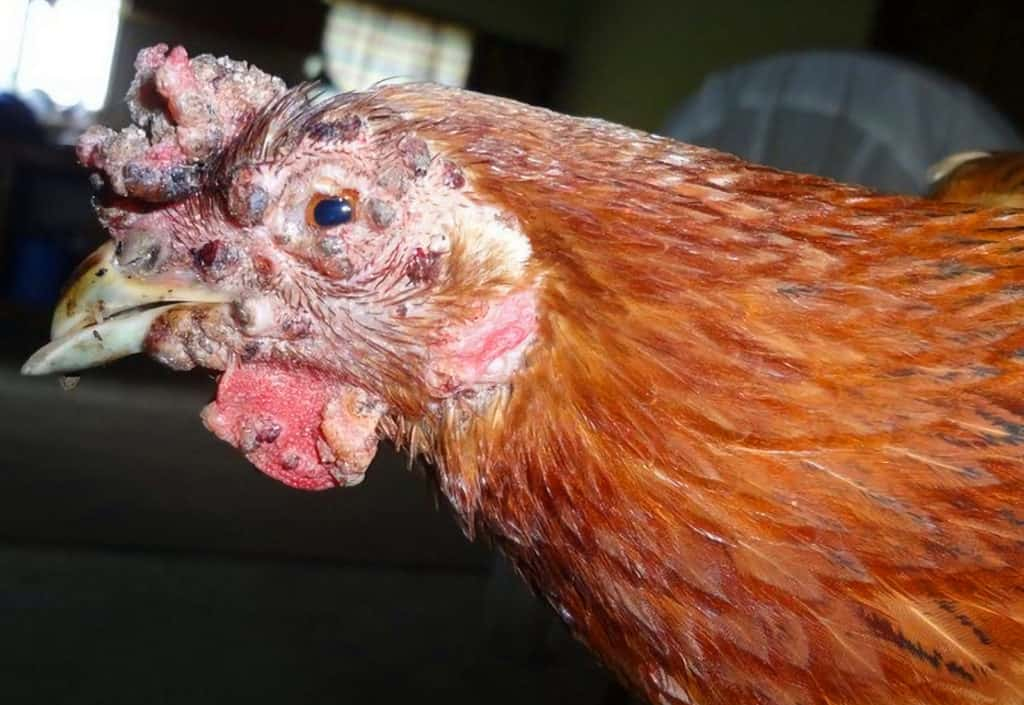Online Chicken Fowl Pox Treatment & Prescription from Home
Online chicken fowl pox treatment consultation - only $65. Get expert virtual vet care for your flock's viral infections without leaving home.
TALK TO A VET

Fowl pox is a viral disease affecting chickens: Types of Fowl Pox: • Dry Pox (Cutaneous form) - Affects skin and external areas - Most common form - Slower spreading • Wet Pox (Diphtheritic form) - Affects mouth and respiratory tract - More severe - Higher mortality rate Transmission: • Mosquitoes and other biting insects • Direct contact with infected birds • Contaminated surfaces • Through skin wounds • Can survive long periods in environment
Key signs to watch for: External Signs (Dry Pox): • Wart-like lesions on unfeathered areas • Scabs on comb and wattles • Growths around eyes and beak • Swelling of affected areas • Crusty formations Internal Signs (Wet Pox): • White patches in mouth/throat • Difficulty breathing • Reduced appetite • Decreased water consumption • Mucous discharge General Symptoms: • Reduced egg production • Depression and lethargy • Weight loss • Reduced activity
Our veterinary team provides comprehensive care: 1. Professional Assessment • Disease confirmation • Type identification • Severity evaluation • Flock risk assessment 2. Treatment Planning We develop supportive care protocols: • Wound management • Nutritional support • Environmental modifications • Prevention strategies 3. Ongoing Support • Regular monitoring • Treatment adjustments • Recovery tracking • Vaccination planning 4. Flock Protection • Biosecurity measures • Vaccination programs • Environmental control • Prevention strategies
Essential care practices for fowl pox: 1. Immediate Actions • Isolate affected birds • Clean and disinfect environment • Provide soft, easily digestible food • Ensure clean water access 2. Supportive Care • Gentle cleaning of lesions • Application of approved treatments • Stress reduction • Temperature management 3. Environmental Control • Mosquito control measures • Regular cleaning • Proper ventilation • Reduced overcrowding 4. Prevention Steps • Regular health checks • Vaccination program • Pest control • Biosecurity measures
Contact Telavets immediately if you notice: • Severe respiratory distress • Complete loss of appetite • Rapid spread through flock • Secondary infections • Wet pox symptoms • Extreme lethargy • Multiple bird deaths Early intervention is crucial, especially for wet pox cases. Our veterinarians can provide immediate guidance and treatment options.
As a practicing poultry veterinarian with 19 years of experience treating viral diseases, I've developed supportive care protocols that significantly improve recovery rates and reduce mortality in fowl pox cases. While there's no specific antiviral treatment, proper management is crucial. Evidence-Based Treatment Protocols: Supportive Care Management: • Isolate affected birds immediately to prevent spread • Provide soft, easily digestible foods (mash or soaked pellets) • Ensure constant access to fresh, clean water • Maintain optimal temperature (70-75°F) to reduce stress • Increase ventilation while avoiding drafts Lesion Management (Dry Pox): • Gentle cleaning with dilute povidone-iodine solution • Application of antibiotic ointment to prevent secondary infections • Avoid picking or removing scabs - allow natural healing • Monitor for signs of secondary bacterial infection Respiratory Support (Wet Pox): • Humidify air using clean water vaporizers • Clear nasal passages gently with saline solution • Provide easily accessible food and water at ground level • Consider tube feeding in severe cases under veterinary guidance Nutritional Support: • Vitamin A supplementation: 10,000 IU daily for immune support • Electrolyte solutions to prevent dehydration • High-protein foods to support tissue repair Recovery typically occurs within 2-4 weeks with proper supportive care. Mortality rates drop from 50% to under 10% with appropriate management.
Throughout my veterinary career specializing in poultry diseases, I've observed that comprehensive prevention strategies can reduce fowl pox incidence by over 95%. The key is understanding transmission routes and implementing targeted control measures. Critical Prevention Strategies: Vector Control (Primary Prevention): • Eliminate standing water sources where mosquitoes breed • Install fine mesh screens on coop windows and vents • Use fans to create air movement that deters flying insects • Apply approved insect repellents around coop perimeter • Remove brush and vegetation near coops that harbor insects Vaccination Protocol: • Vaccinate all birds at 12-16 weeks of age with live fowl pox vaccine • Annual boosters recommended in high-risk areas • Wing-web stick method provides lifelong immunity • Vaccination during active outbreaks can help unaffected birds Biosecurity Measures: • Quarantine new birds for 30 days minimum before introduction • Disinfect equipment and tools between different bird groups • Limit human traffic and require footbath use • Control wild bird access to feed and water sources • Maintain visitor logs and health declarations Environmental Management: • Remove sharp objects that could cause skin wounds • Maintain dry, clean bedding to reduce bacterial loads • Provide adequate space to prevent fighting and injuries • Regular health monitoring to detect early cases Nutritional Support: • Ensure adequate Vitamin A levels (8,000-10,000 IU/kg feed) • Provide balanced nutrition to support immune function • Consider immune-boosting supplements during high-risk seasons In my practice, flocks following comprehensive prevention protocols show 95% fewer fowl pox cases and maintain higher productivity year-round.